7 Best Obsidian Alternatives in 2025
Obsidian
17th Feb, 2025
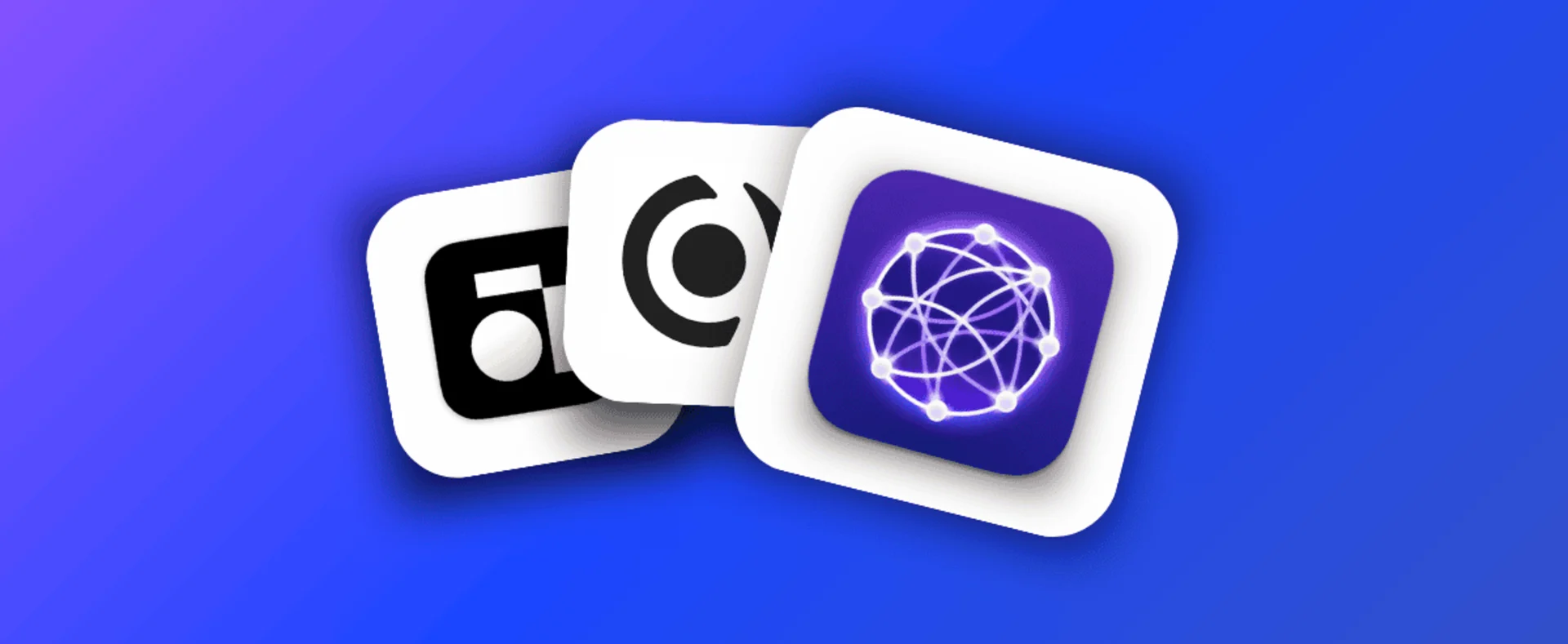
Obsidian is fantastic, but it might not be for you. There are dozens of PKM apps similar to Obsidian for collecting notes, connect & build your digital brain. Let's explore the best and brightest Obsidian alternatives on the market.
Obsidian is a widely popular tool thanks to its accessible nature & features.
Many people on a budget looking for a robust PKM tool will love Obsidian, but others might want more powerful features. Obsidian might get you only so far.
Similar to Obsidian, these tools are alternatives designed to give you the PKM powers of Obsidian but go beyond Obsidian's needs and give you other options to consider. They range from the object powers in Anytype to the security built into Reflect.
Let's explore all the best Obsidian alternatives right now.
List of the Best Obsidian Alternatives
Here are the top-rated Obsidian alternatives to consider:
Tool | Special Features | Pricing Upgrade ($) |
|---|---|---|
1. Logseq | Flashcards & whiteboards | Free |
2. Capacities | Object-based notes | $10 per month |
3. Anytype | Object-based notes | $99 per year |
Powerful block references | $15 per month | |
5. Notion | Databases | $10 per month |
AI features | $10 per month | |
7. Evernote | Planner & task features | $14.99 per month |
Why move from Obsidian?
Obsidian is free & does come with good features, but here are some of the reasons why people are considering moving to other similar tools:
- Obsidian doesn't offer sync built into their primary service, meaning you need to set up something like iCloud Sync to set up your mobile device access.
- Obsidian can be pretty intense to learn and start with as a tool.
- Many people don't like the look and feel of Obsidian; everything is subjective, but many people don't find Obsidian an attractive option.
These are just some of the opinions in the Obsidian space.
1. Logseq
Best Like For Like Alternative
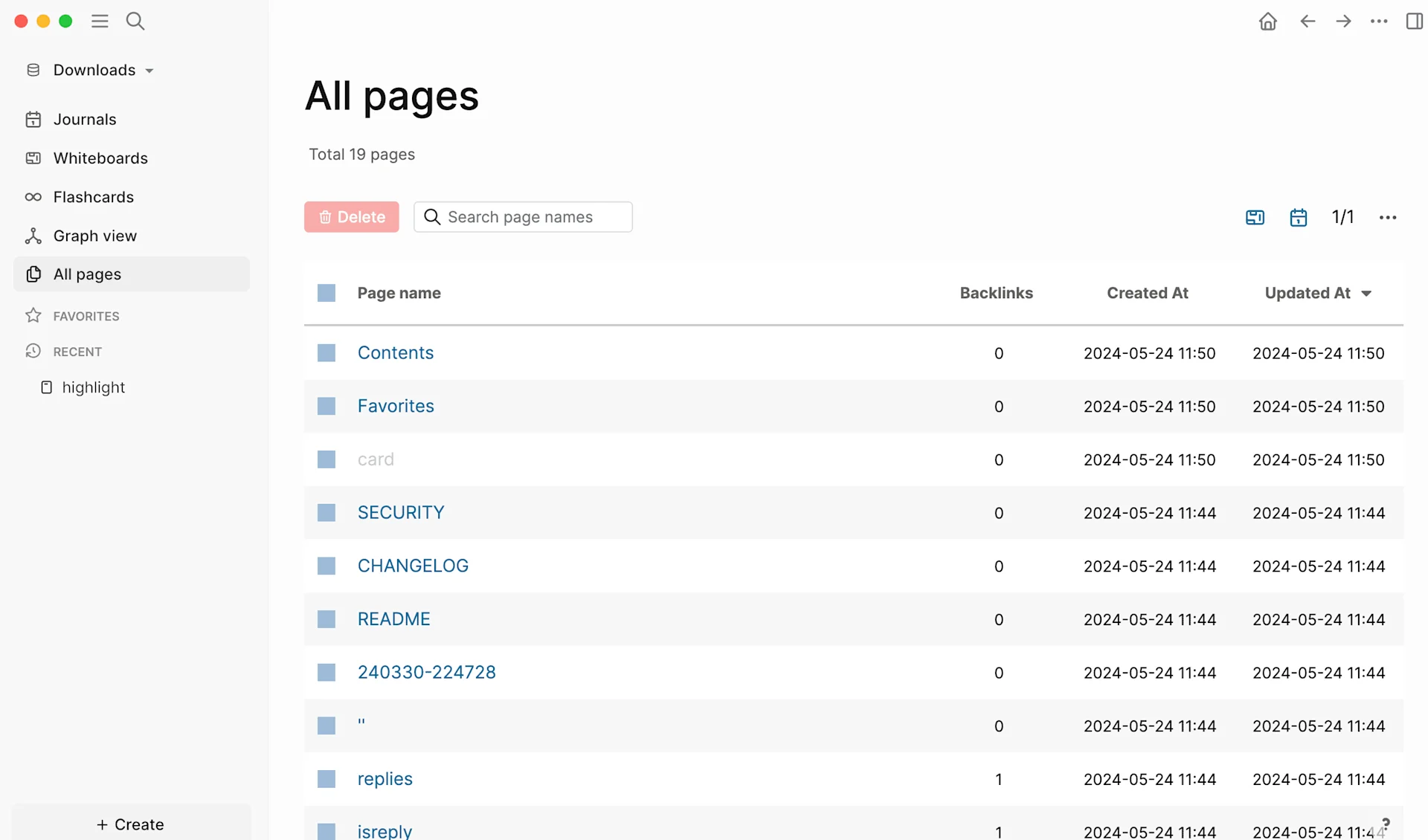
How does Obsidian compare to Logseq?
Logseq is very similar to Obsidian. They share many of the same DNA with a few core differences, including a focus on flashcards and offerings.
Much like Obsidian, Logseq has the following features and ethos like Obsidian:
- Open source
- Local first storage
- A good community of users
- Range of extensions
- Markdown files and storage
However, Obsidian and Logseq have a core difference: They focus on flashcards and currently offer no pricing, meaning you can use all the features for free.
What makes Logseq different from Obsidian?
Flashcards are the primary difference for people looking between these two.
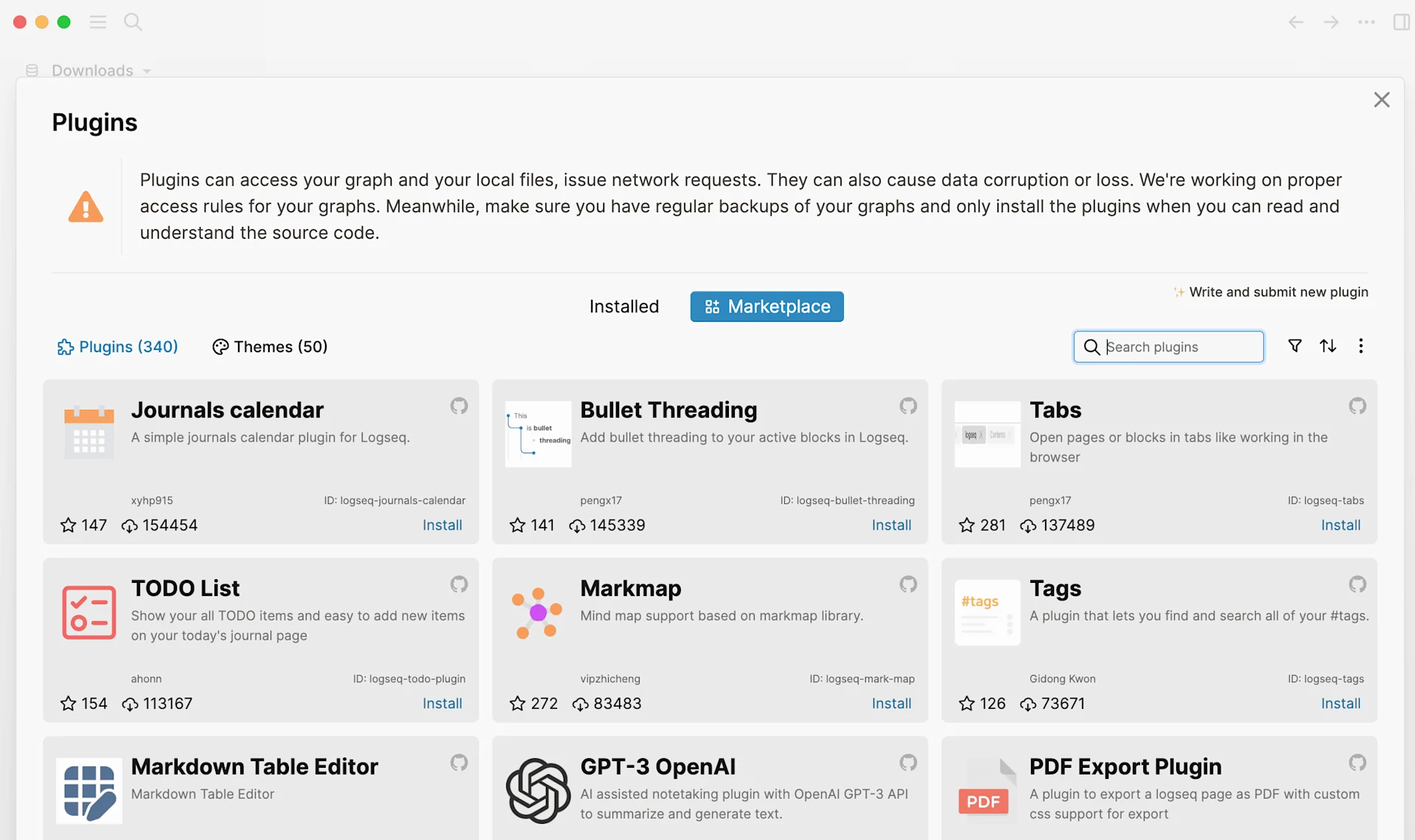
Flashcards allow users to create notes that can be converted to flashcards and reviewed as part of a spaced-repetition system. Many people compare the system to RemNote, but in our opinion, it doesn't have a structure that is as comprehensive as RemNote.
The experience with this and the PDF annotation feature make Obsidian somewhat similar to Logseq. Still, many people find the community's infrastructure to be better and more robust with Obsidian as they have more extensions, themes & active users growing the tool further.
Should I go with Logseq or Obsidian?
Logseq is not currently offering premium features, which some people worry about because Obsidian offers a more robust framework that seems to be funded by the community.
The toss-up seems to be whether you find flashcards more valuable and whether you are for more themes & extensions. The Obsidian community has 10x the number of plugins from their community versus Logseq's 150 extensions, but both are growing.
What is Logseq?
Logseq is a networked thought note-taking application that can create notes, create daily notes, connect notes and visualize in a graph view, use a whiteboard to bring ideas together, and even turn notes into flashcards.
Logseq is similar to Obsidian for managing notes and PKM systems.
2. Capacities
Best for PKM & Note-Taking Balance
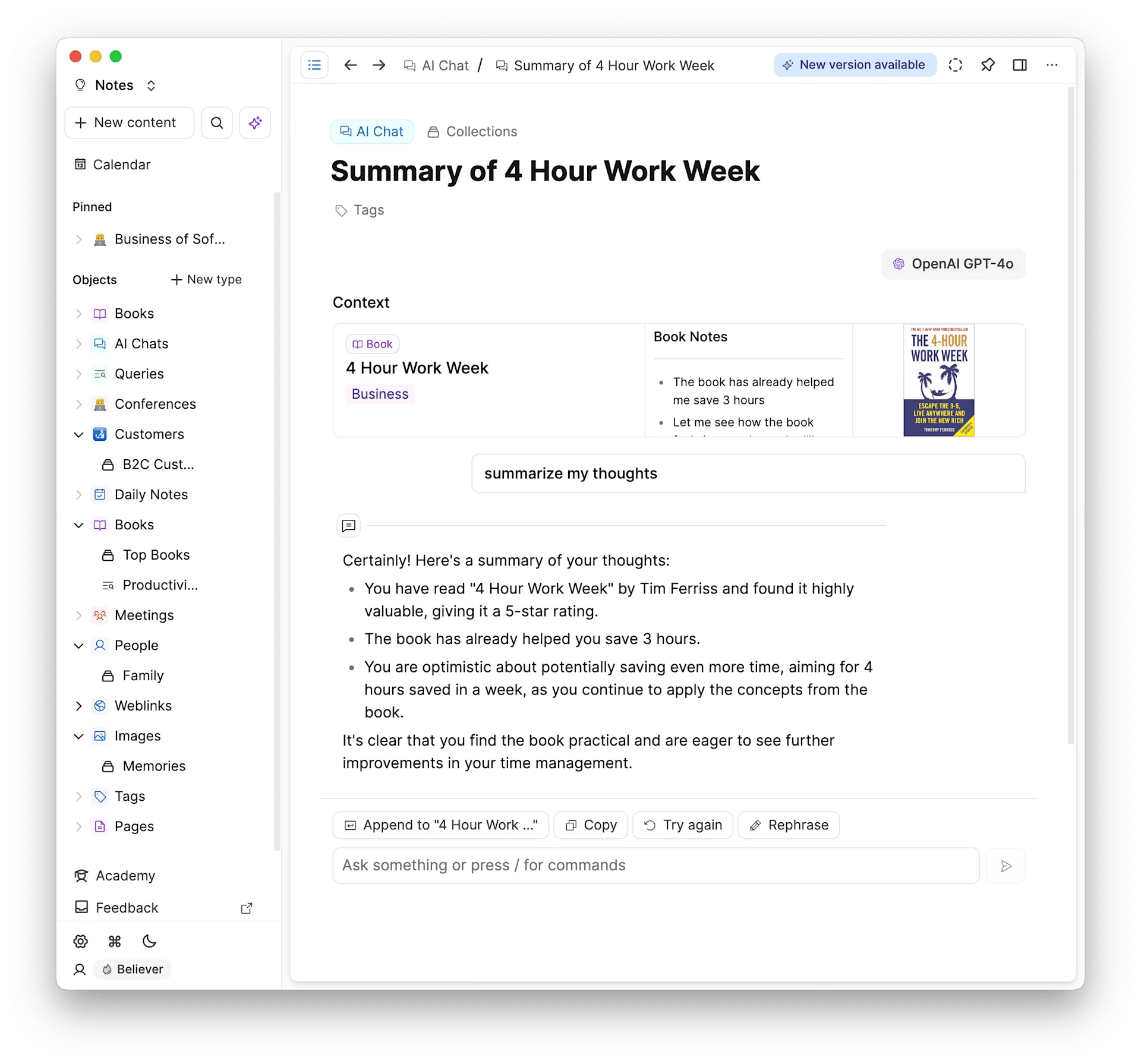
Is Capacities a good Obsidian alternative?
Capacities is an interesting Obsidian alternative, not wholly a like-for-like replacement.
The application has a unique style of organizing its notes called object-based note-taking, a system designed around the concept of creating objects instead of notes to organize your note-taking application, something worth exploring before checking it out.
From the outset, Capacities looks minimal and clean, closely resembling Notion in nature. Many people refer to it as the PKM version of Notion, which is good for those who appreciate aesthetic designs.

What differences does it have to Obsidian?
The application shares similar features with Obsidian, such as daily notes, the ability to connect notes, a graph view, and the capability to interweave relationships between notes.
Capacities make how notes are connected more apparent, providing a clearer view of their relationships. The free plan does not limit the number of notes you can add, but premium features like AI Chat are locked behind the premium version.
The application is becoming increasingly popular in the PKM and note-taking space, with many users claiming it offers more detailed features than Obsidian.
However, it lacks abilities, such as open canvas planning, which Obsidian offers with its Canvas feature. Capacities also don’t operate fully locally like Obsidian, but it is more suitable for those seeking a balance between an advanced PKM map and a note-taking app.
What is Capacities?
Capacities is an object-based note-taking application that focuses on building relationships between notes. It is popular for journalling, making notes, and managing personal ideas. It comes with markdown notes, local-first optionality & PKM features.
It can be used to manage daily and personal notes and organize work meetings and beyond. Many people find Capabilities to be a good balance between Notion and Obsidian.
Pros:
- Beautiful Notion-like design
- It comes with a calendar mode for daily notes
- Works well offline with near offline functionality
- Comes with AI features for chatting with notes
- Easy to use once you get started
Cons:
- Lacks powerful databases
- It can be complicated for the average note-taker
Pricing:
Capacities are free to use, with a $9.99 per-month upgrade needed to access premium abilities.
3. Anytype
Best Object-Based Obsidian Alternative
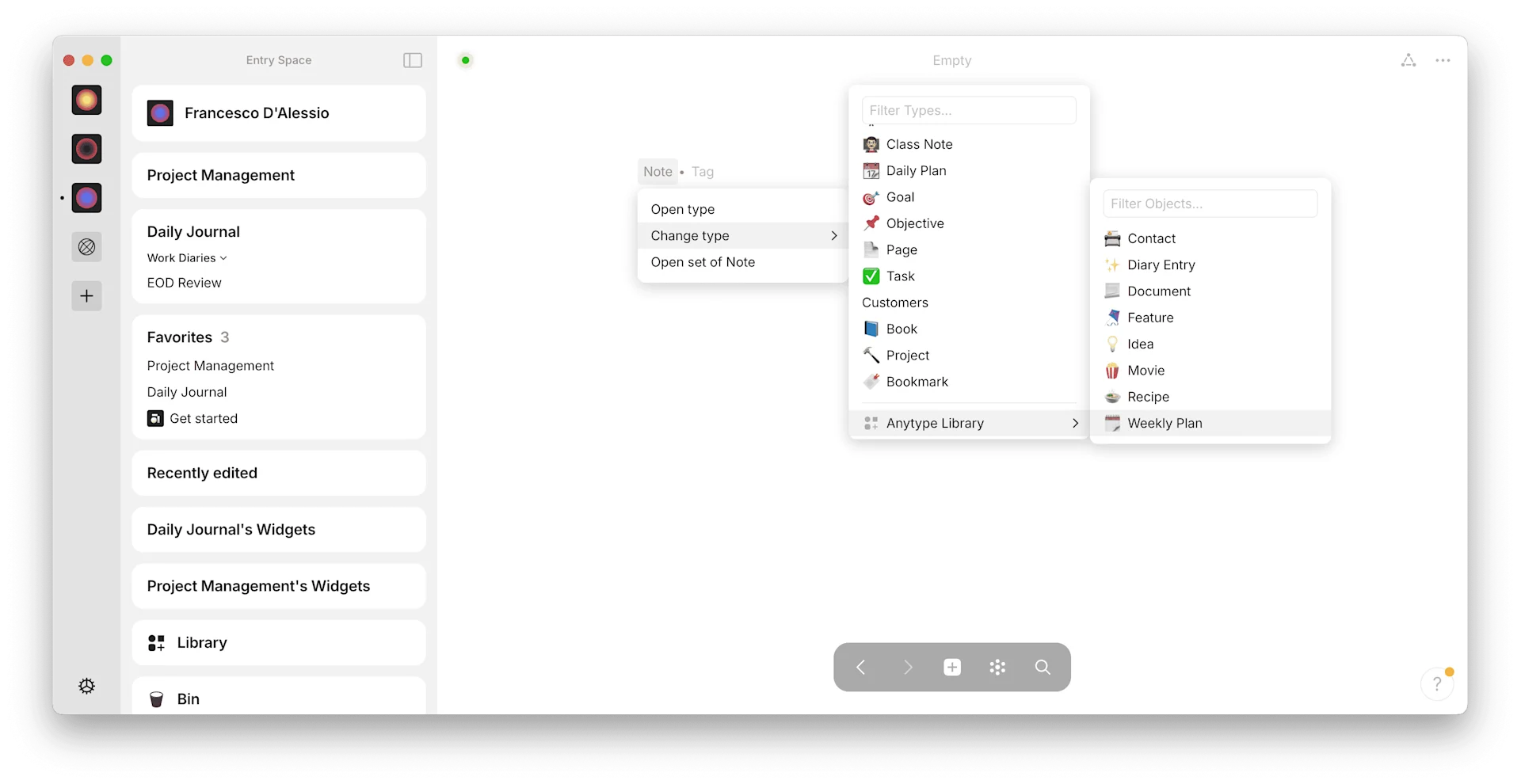
How does Anytype compare to Obsidian?
Anytype is a relatively new application on the market, but it's been growing in popularity. Like Obsidian, it focuses on a local-first experience. It allows you to take all your files and documents offline, giving you that security element that many other PKM applications are starting to move towards.
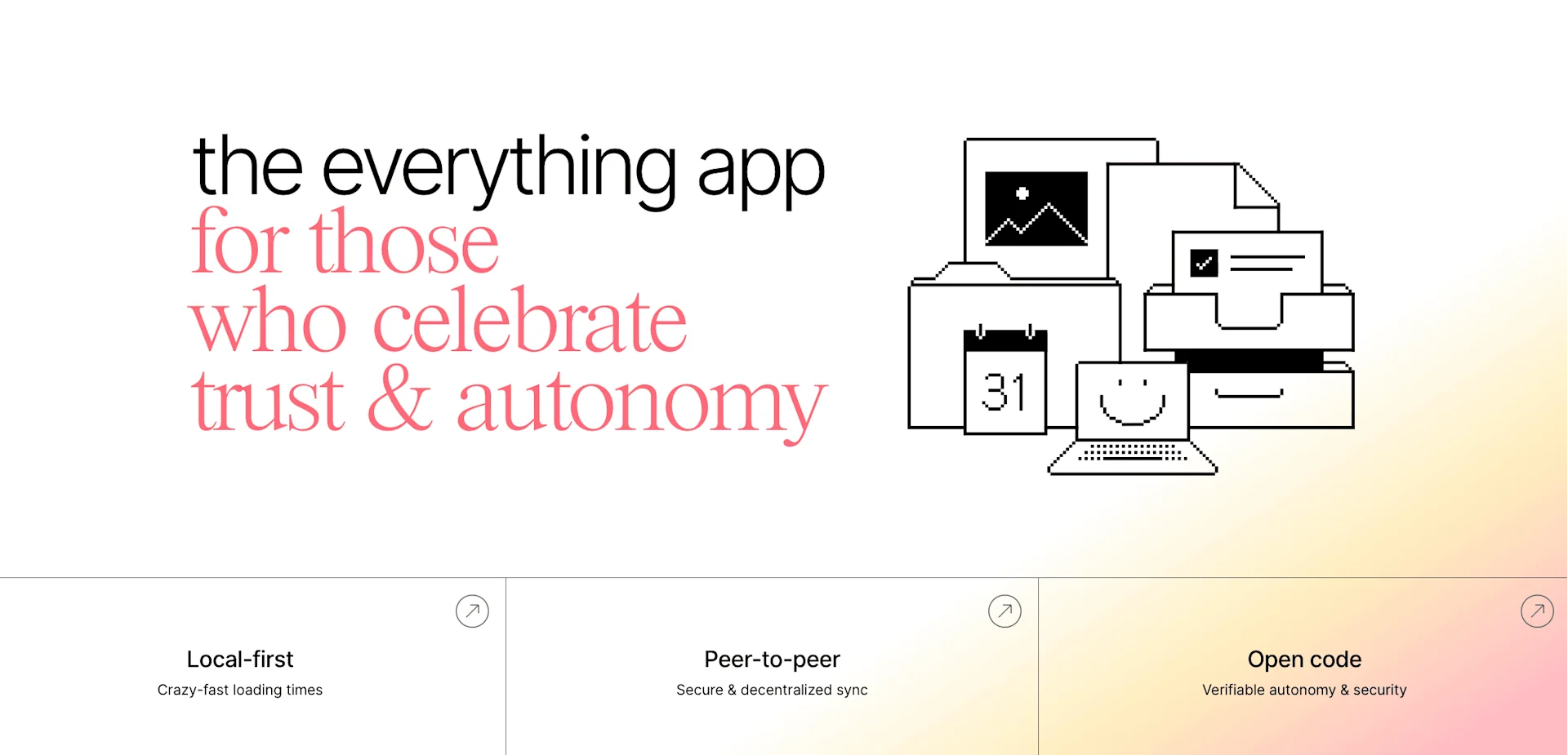
Both Obsidian and Anytype are fairly similar in nature with their focus on security, aiming to bring things local. But Anytype seems to go slightly further than Obsidian in how they set things up. In terms of syncing, Anytype has a peer-to-peer secure and decentralized syncing function, as well as open code, meaning it's open-source and comes with features like Markdown. You also have encryption and encryption keys on the device, which we don’t believe are available in Obsidian.
Object-Based Structure Differences to Obsidian
Largely, Anytype takes a different approach to structuring. It creates everything from an object, a concept called object-based note-taking, which has been growing in popularity, especially with apps like Craft and Capacities.
This new focus allows you to build a note with a template and structure before you actually craft it. It's perfect if you want to create something like a person you've interacted with, a meeting, or a type of note like a book or author that you want to expand on in the future. While this does take more time to set up, it has long-term benefits for how you structure your note-taking.
That's how Anytype differs from Obsidian, but the functions are still fairly similar in terms of linking things up. Anytype doesn’t focus as aggressively on PKM elements. For example, inside Obsidian, you have the research-based canvas feature. Anytype doesn’t have that, but it does include databases.
These don’t rival Notion’s databases, but they come relatively close as a way for organizing ideas and bringing objects into one place. You can organize those in sets and collections, and many people are moving toward those types of experiences.
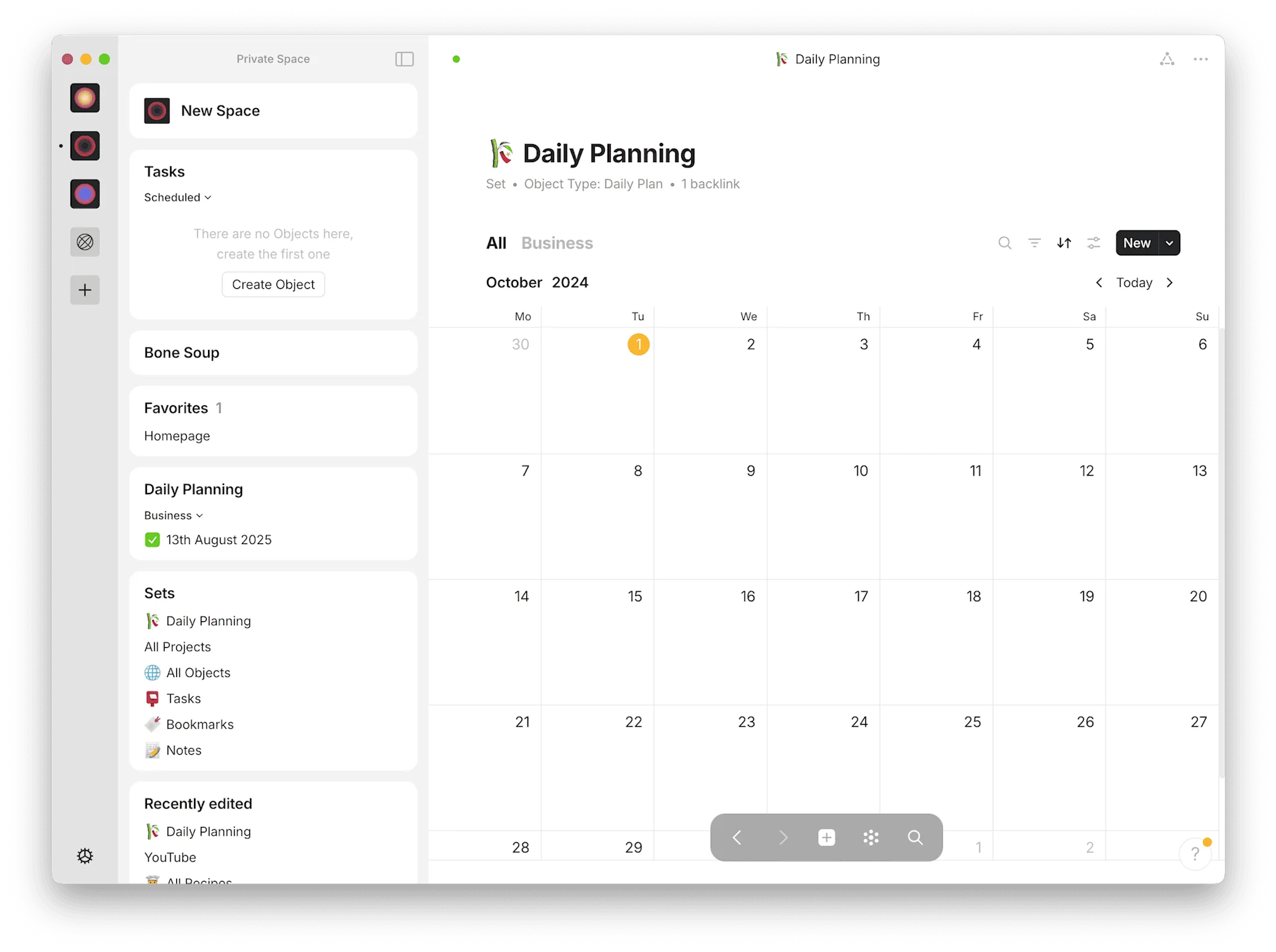
Anytype hasn’t been on the market as long as Obsidian, but it offers a generous free plan with 1GB of network space and three shared spaces. If you want to upgrade, it costs $99 per year, which is double Obsidian’s pricing and might be out of reach for some people. However, Anytype’s focus seems to be on helping you create secure nodes.
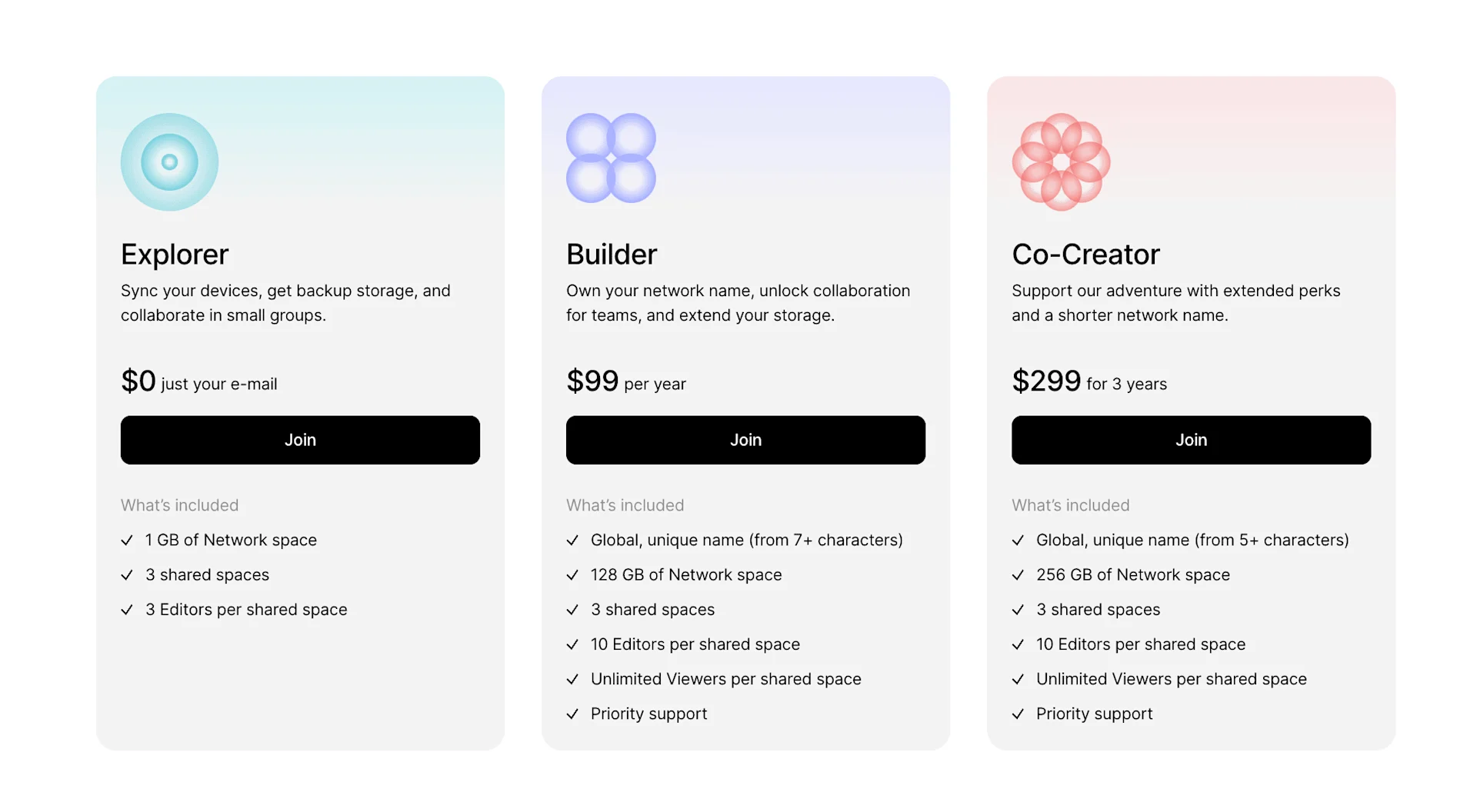
In terms of nodes, Anytype is a bit more open than Obsidian. For instance, Obsidian doesn't really allow for collaboration, but Anytype lets you create things like team wikis or team canvases for collaborative work with as many people as you want.
Should you consider Anytype?
Both Anytype and Obsidian can be used for journaling, but for habit tracking in Obsidian, you'd need to install an extension, whereas Anytype has templates to help get you started.
As a whole, Anytype feels more approachable than Obsidian—less noise and more consumer-friendly. When we tested Anytype, while it took time to learn like Obsidian, it was friendly and easy to use, with a solid security focus. Like Obsidian, it also offers a fast and easy-to-use application to help you get started.
What is Anytype?
Anytype is an open-source, local-first note-taking application for macOS, Windows, iOS, and Android. It also has a Chrome extension for clipping notes.
Anytype creates notes as objects to save notes with a structure—e.g., meeting, person, book. It also has E2E security on notes and a growing community.
It is a popular Notion alternative in the local-first note-taking community with an ethos and focus on secure note-taking. Anytype uses object-based note-taking to help organize your notes with more structure.
Anytype Pros
- Open-source note-taking
- Local-first and peer-to-peer networking
- Works with markdown and native on desktop
- It comes with sets and collections for set-ups
- Good-rated iOS, and Android on respective App Stores
- Privacy-focused notes with E2E secure notes
- Good community and audience
Anytype Cons
- It can be overwhelming to use
- Limited database abilities compared to Notion
- Still developing features
4. Roam Research
Best Hardcore PKM Alternative
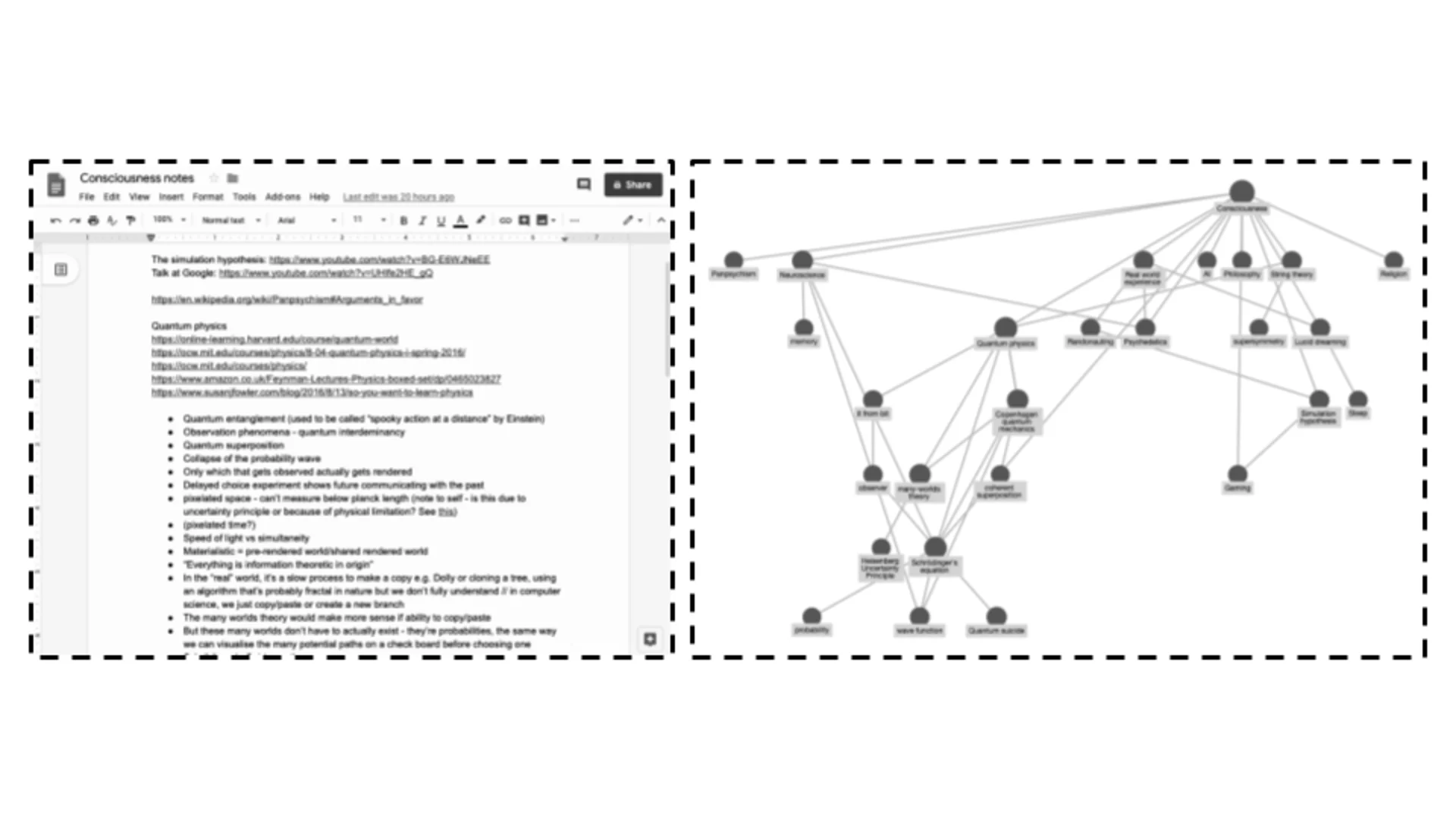
How does Roam compare to Obsidian?
Roam Research has long been a competitor to Obsidian, with a focused audience and community that hold strong opinions on how connections should be made. The application has evolved significantly and is now available on many devices, including desktop, iOS, and Android, which is great news.
Is it a pricier alternative to Obsidian?
Many users claim that it helps them think through problems better, and it's used by many high-caliber researchers as a way to organize ideas and daily content.
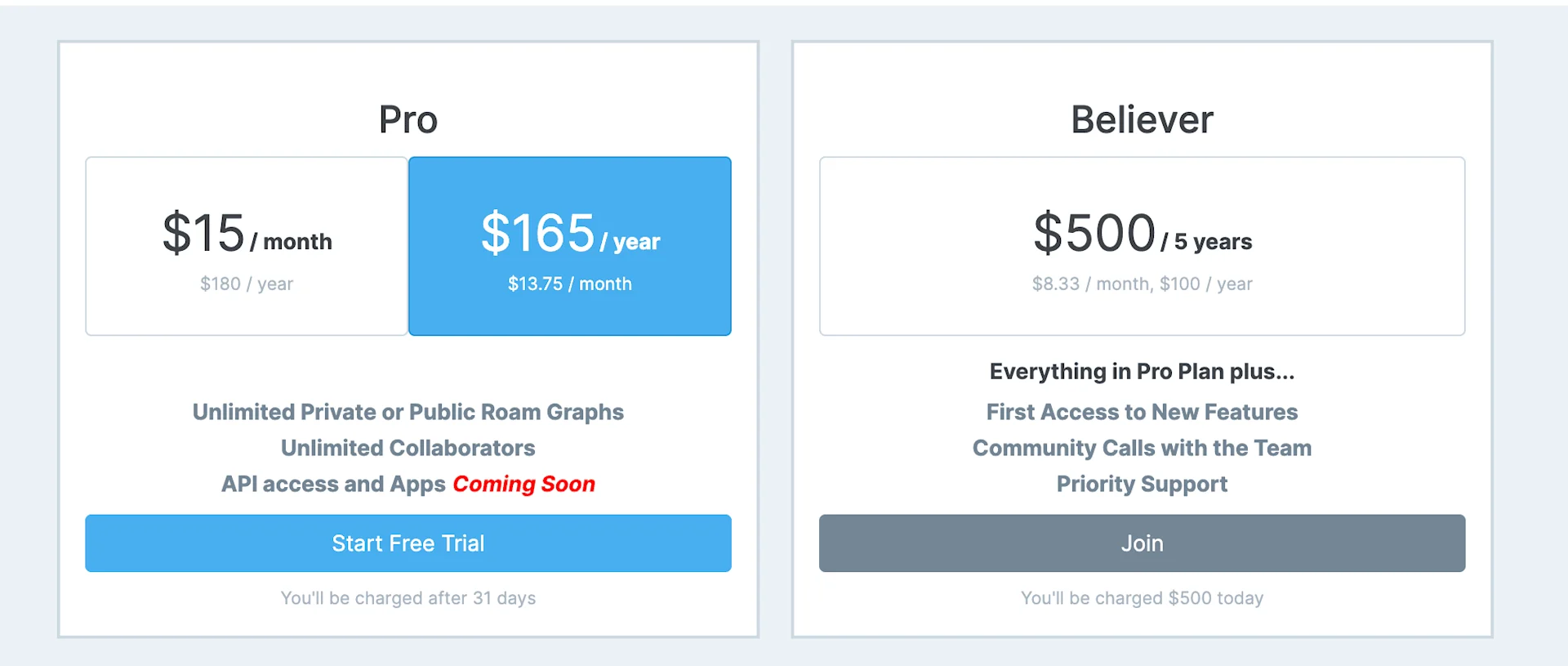
However, compared to Obsidian, Roam Research is much more expensive, costing $15 per month, or $180 per year. There's a free trial, but no free plan, so if you're looking for a cost-free alternative to Obsidian, Roam might not be the best option.
Should I move to Roam from Obsidian?
When we last tested Roam, it impressed us as a tool for connecting and organizing ideas, but the application felt very opinionated and raw. It's more complex to understand initially than Obsidian, in our opinion. Roam comes with many powerful features, such as encrypted graph views, linked references, filtered backlinks, and advanced sidebar functionalities.
These include hotkeys, block references, backlink attribution, and user-created features like Pomodoro timers, text expanders, Kanban boards, and various text formatting options.
Overall, Roam Research is designed for those who want to push their Obsidian experience further, offering strict setups and opinions on how to create and connect nodes.
What is Roam Research?
Roam Research is a powerful PKM tool designed for pro note-takers to make notes, capture ideas, and most importantly connect them up using backlinks & a graph. Roam Research is on desktop and web.
Many people who get Roam are much more sold on the concept and the PKM focus than are looking for a more simple note-taking application.
5. Notion
Best Team Collaboration Alternative
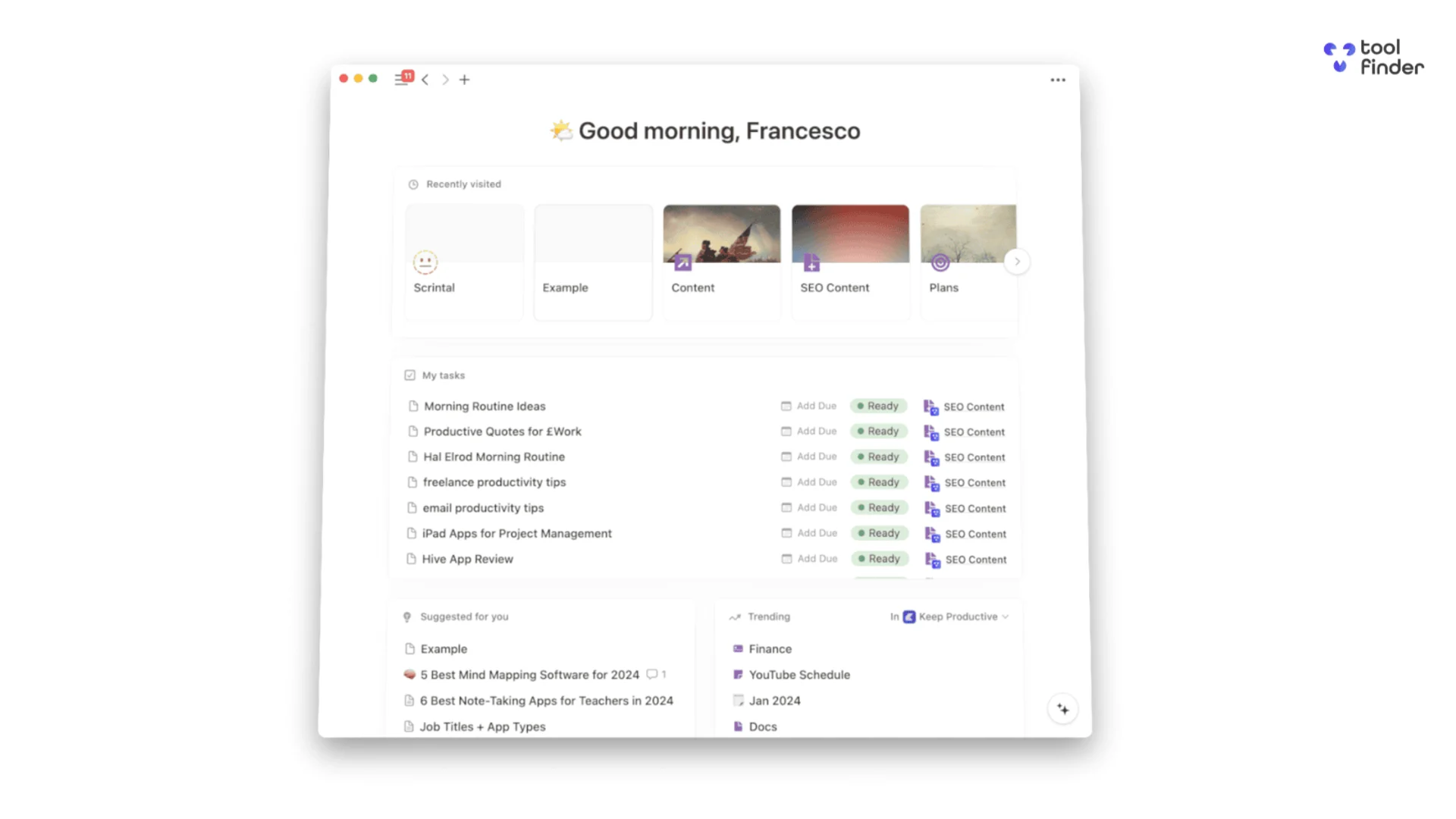
Is Notion a good replacement to Obsidian?
When looking at Notion as an alternative to Obsidian, it stands out because it's free and allows unlimited notes, but it doesn't have the same PKM (personal knowledge management) power that you might expect from other applications.
However, it offers features like templates, which can help you build structures without needing to dive into complex details. While Notion can be a bit tricky to learn at first, it’s not as challenging as learning Obsidian. Obsidian requires extra effort due to its markdown format and networked thought structure, while Notion is more open and flexible in comparison.
Team Collaboration Differences
If you're considering Notion, it's likely because it’s better for team collaboration and makes it easier to set up your account structure. Implementing templates in Notion is simple, and you can create almost anything within it, whereas Obsidian’s functionality can be limited by what plugins allow.
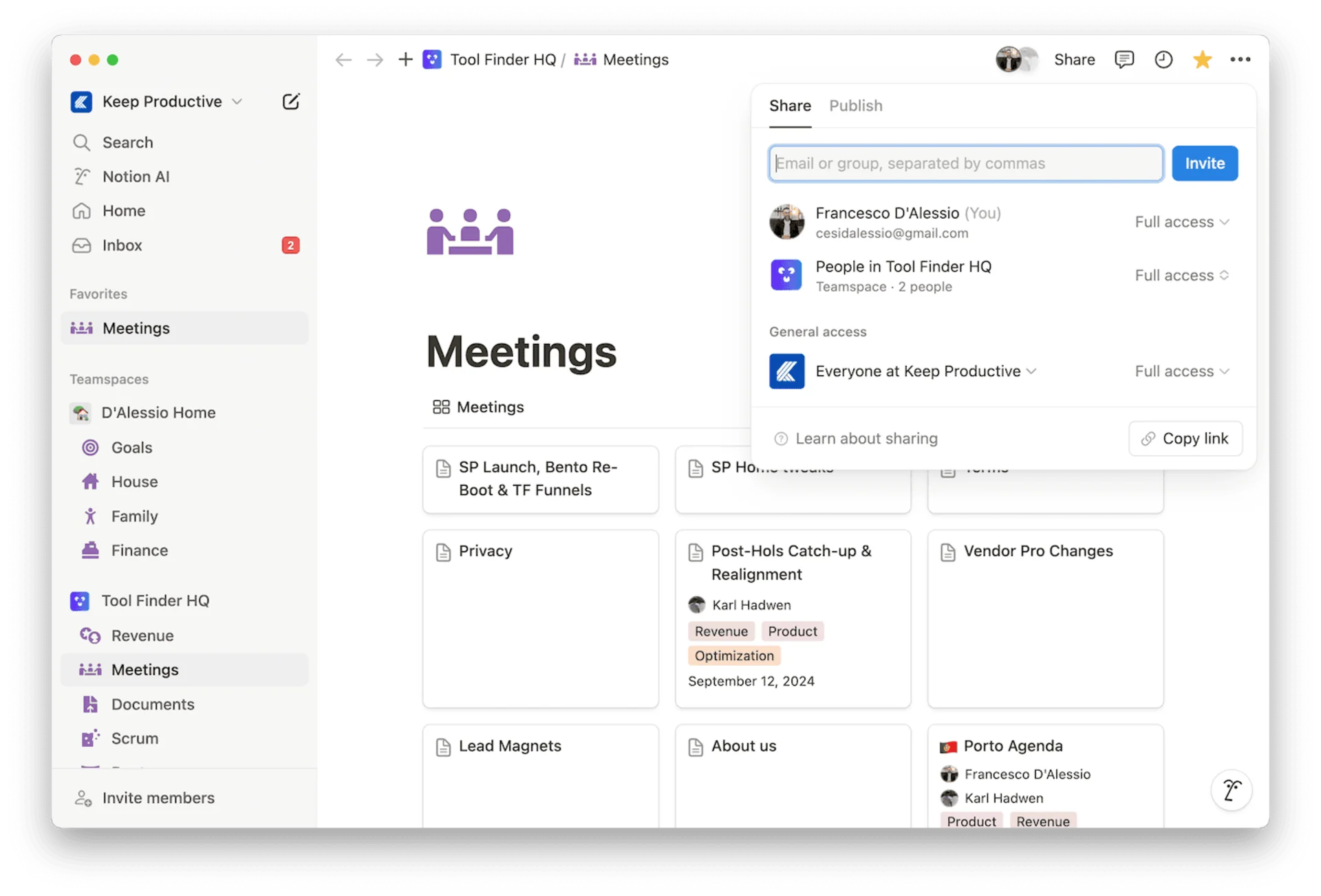
Although Notion has no canvas view for collaboration, it continuously adds new features that enhance note-taking. Notion also includes built-in artificial intelligence, but it's locked behind the paid plan, something to keep in mind if you're interested in AI features.
Overall, Notion is more approachable because its note-taking feels more like working with documents. You can easily collaborate with others, and you can link notes using the @mention feature. This also allows you to view backlinks on your pages, making long-term note management easier.
Should you get Notion?
While you can create a PKM system in Notion, it may take some time to set up. In comparison, Obsidian focuses more on local-first management, and Notion’s offline mode is less reliable, something that’s often criticized in the community.
If you’re looking for a free, more approachable alternative to Obsidian that’s geared toward team collaboration, Notion might be the tool for you.
What is Notion?
Notion is an all-in-one productivity app for notes, project management, tasks, and calendar management. It is available for macOS, Windows, web, iOS, and Android. Although it is a complex tool, users can use the no-code layout to build workspaces for any scenario.
Notion has been a popular Evernote alternative.
6. Reflect Notes
Best Secure Obsidian Alternative
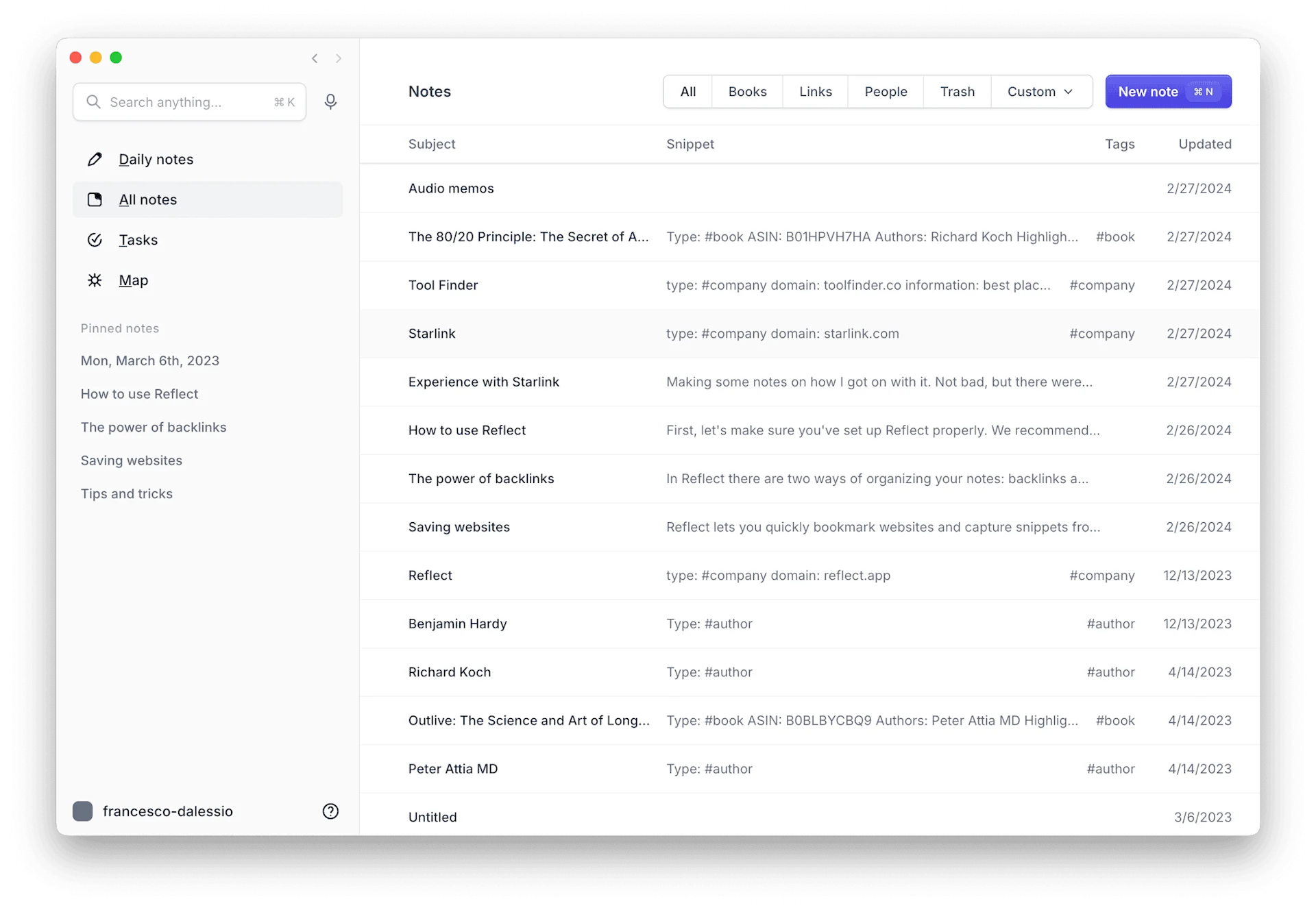
Is Reflect Notes a good alternative to Obsidian?
Reflect Notes is a nice alternative to Obsidian, with its key appeal being its approachability. The application is simple but includes popular PKM features like graph views and backlinks for connecting notes. However, it's currently geared towards iOS and Mac users, with support limited to those devices.
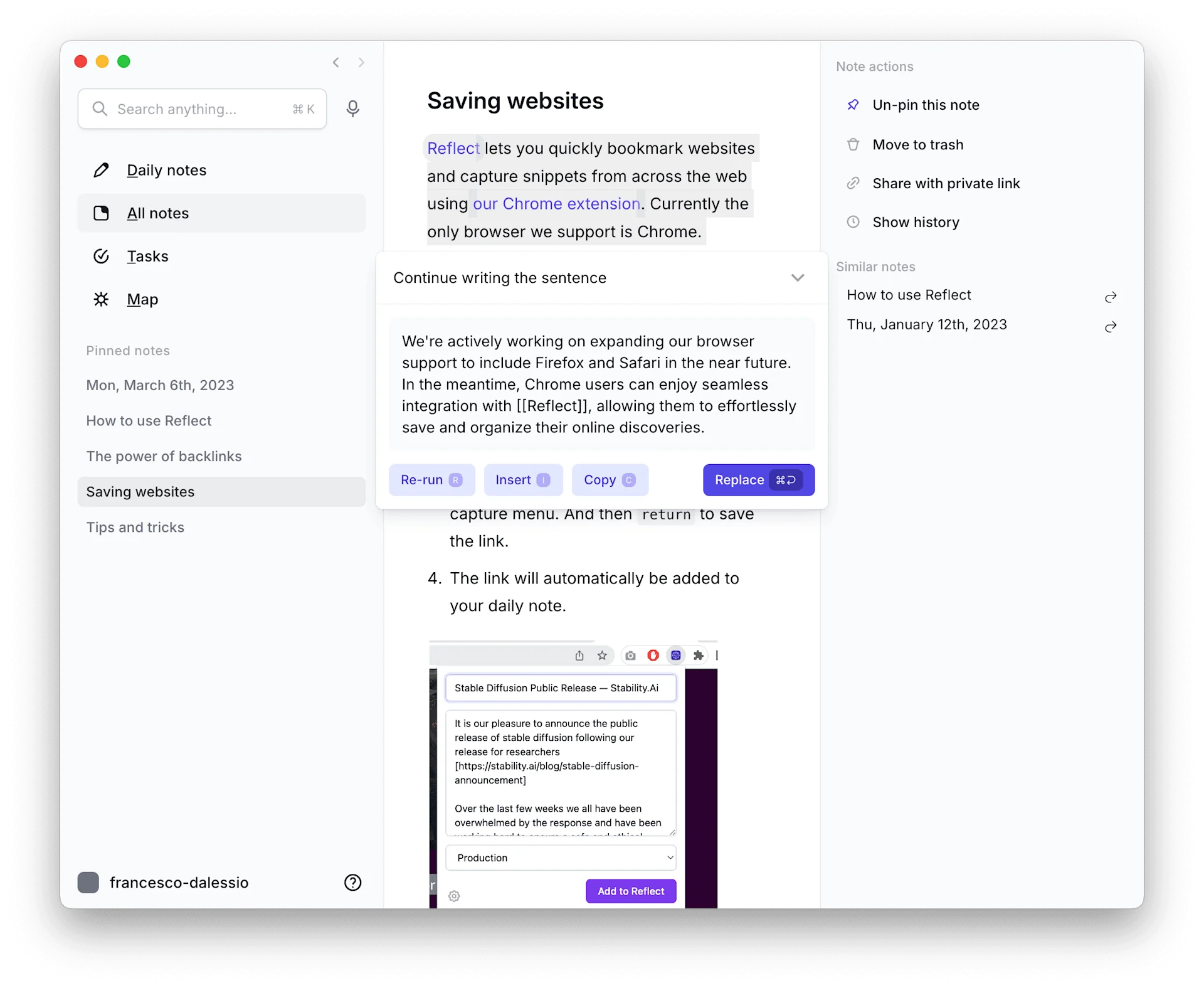
From the start, Reflect Notes offers end-to-end encryption for your notes and integrates with calendars like Outlook and Google Calendar, making it easy to bring in specific meetings.
AI differences with Reflect Notes to Obsidian?
Reflect also has a strong focus on artificial intelligence. It helps users formalize notes, ask questions about them, and create key takeaways. It can also correct grammar and spelling, and even allows custom prompts that can be used regularly.
Another useful feature is voice note transcription, making it easier to capture notes in different ways. Reflect emphasizes security with its end-to-end encryption, which is central to its branding, much like Anytype.
Reflect is a popular choice for users who enjoy Kindle and Readwise because it offers Kindle Offline Sync, Kindle Highlight Sync, and Readwise integration, allowing for better collaboration and organization of reading materials.
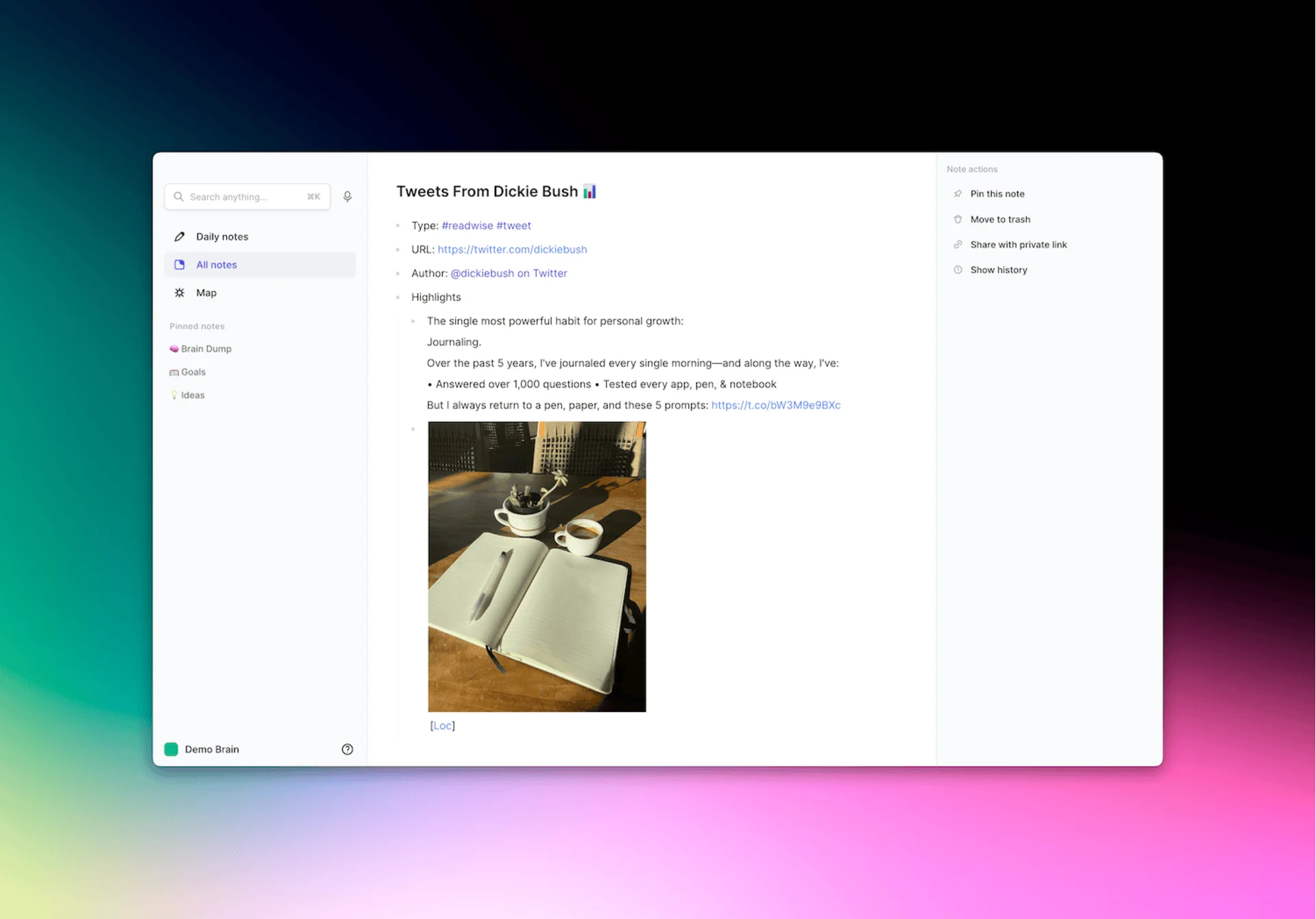
While Reflect Notes doesn’t have a feature like Canvas for visualizing ideas as Obsidian does, and its graph capabilities may not be as advanced, it counters with task management features. However, many of these functions can be added to Obsidian via plugins.
Should you get Reflect Notes?
Reflect Notes is priced at $10 per user per month, billed annually, which might be a bit expensive for some users, especially when Obsidian offers many features through free plugins. Still, Reflect is a well-built application with a strong focus on long-term note management, particularly with its AI features.
What is Reflect Notes?
Reflect Notes is a note-taking application with networked thought abilities and AI.
It is available on macOS, web, and iOS and has been featured as a good AI note-taking app.
7. Evernote
Best Up-and-Coming Alternative
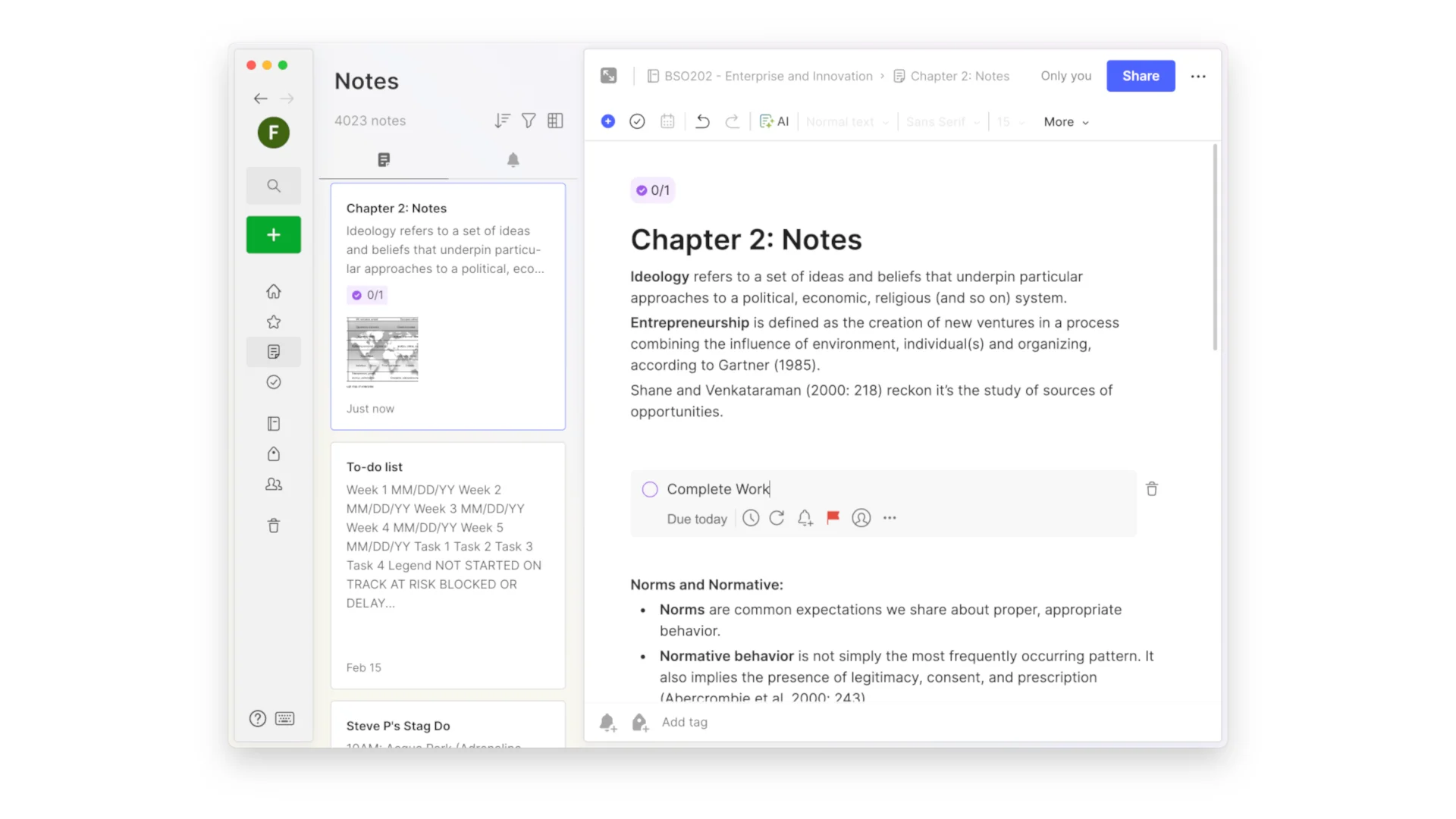
Evernote as an Obsidian Alternative
Evernote has gone through many changes in recent years, and a lot of people have transitioned from Evernote to Obsidian because of that. However, if you've tried Obsidian and found it doesn’t fit your needs, Evernote could be worth reconsidering.
Another company acquired Evernote called Bending Spoons, and they are focusing more on improving the product. That said, it has become more of a paid experience than before, so if you're looking for a free alternative to Obsidian, Evernote might not be the best option due to its recent pricing changes.
Despite the shift toward a paid model, Evernote now offers a lot in terms of productivity. There's a new task management feature that helps you plan and organize tasks, along with a planner view that links notes to upcoming meetings and syncs with calendars like Outlook and Google Calendar. Evernote also shines in collaboration, with its new real-time editing (RTE) feature allowing you and others to work on a note together at the same time.
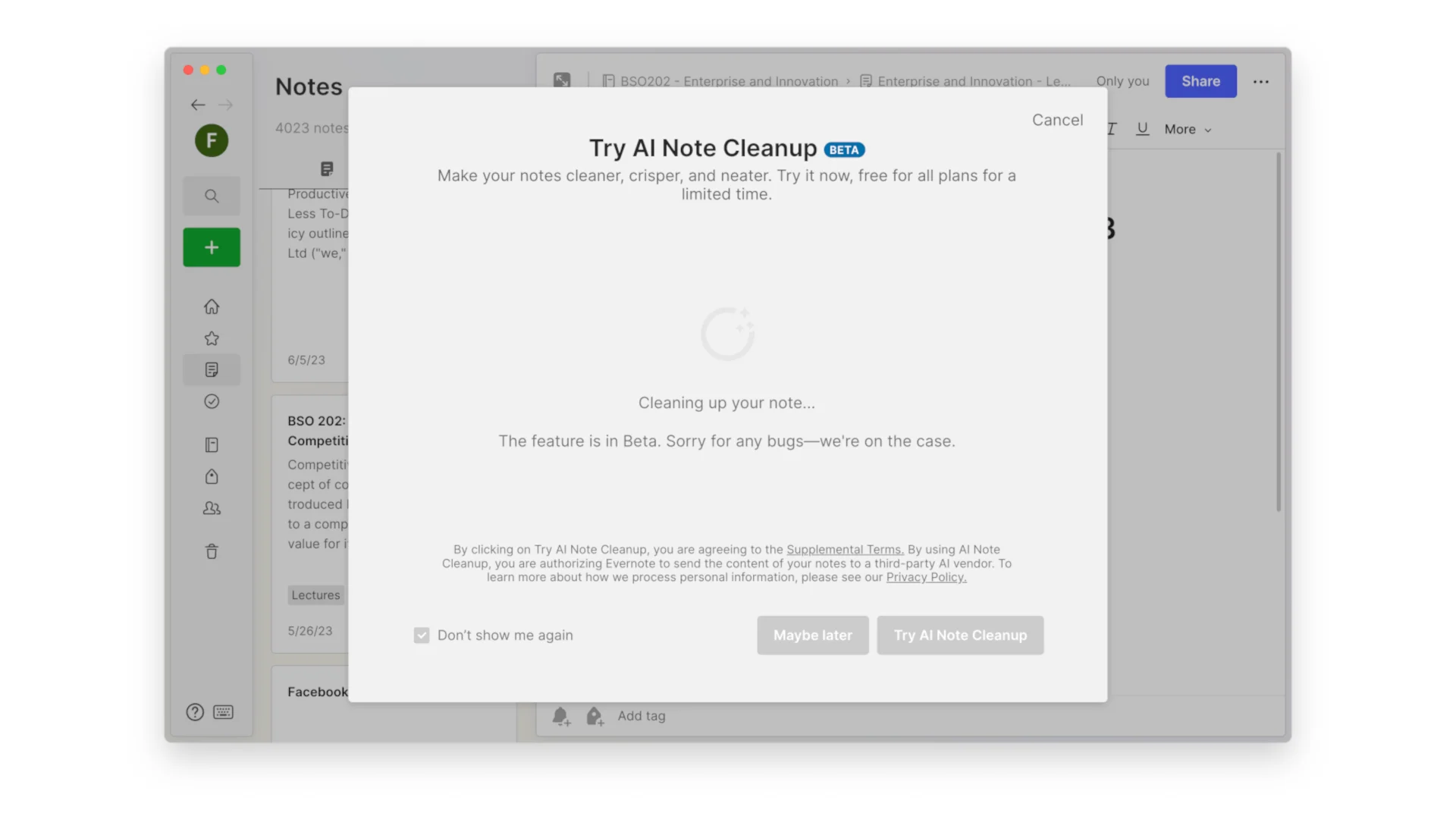
Should you consider Evernote?
Additionally, Evernote has introduced new AI features, such as advanced search capabilities, the ability to scan images for relevant text, and other helpful tools, making it an increasingly appealing option for users.
However, as an Obsidian alternative, it lacks some key features that Obsidian users might value, such as a canvas view, deep backlinking (though it does offer a light version), and a graph view. Evernote also doesn’t emphasize a local-first experience, but it does offer offline mode, which is more reliable than Notion’s.
At $15 per month, Evernote is comparable to Roam in terms of pricing. If you initially moved to Obsidian because of its lower cost, Evernote might not be the right fit for you.
What is Evernote?
Evernote is a note-taking application that was first built in 2000. It is available on iOS, Android, macOS, web, and Windows. Professionals and individuals use it to take notes, add tasks & manage calendar notes in one.
It is famous for note-taking and has a traditional format for collecting and organizing notes. Bending Spoons acquired Evernote and are the developers and owners.
Pros:
- Bring all your tasks, notes & calendar in one
- Comes on iOS, Android & all desktop
- Comes with famous Web Clipper on the browser
- Bending Spoons has been actively developing
Cons:
- Much pricier than before
Pricing:
Evernote is $14.99 per month with a limited free pricing.
Video: Evernote Review
Here's everything you need to know about Evernote in 2024:
More Obsidian Alternatives to Consider
These are some more alternatives on the market similar to Obsidian:
Which Obsidian Alternatives to Pick?
So, now you have seen five of the best alternatives to Obsidian, which one though?
- Logseq, Reflect Notes and Roam Research all provide a real in-depth linked note-taking experience that might that a little while to get the hang of. However, if you are looking to build up a second brain system over time, it's not a bad idea to begin learning as you go. Over time you'll create connected graphs of notes to look back on and spark ideas and learn new things.
- Mem provides you with an AI note-taking experience that may be easier to pick up right away, especially if you are looking for somewhere to write quick notes and summarise them to gather thoughts and ideas in one place.
- Finally, there's Craft. This is the most different in this list of Obsidian alternatives because it doesn't really have the linked database of notes thing. It's more a place to create in-depth documents of notes, cards, and pages to share with others or to keep a journal of thoughts and ideas for yourself.
If you're interested in learning more about what a second brain app is, you can check out our other articles and guides for second brain tools too.
Oops, undefined is still in development...
Weekly Roundup: Explore People's Productivity Tools
Become a reader to our newsletter exploring what productivity apps people use on a daily basis to get things done